When you think of Hollywood’s most charismatic performers, Dwayne Johnson ethnicity represents one of entertainment’s most fascinating multicultural stories. The man known worldwide as “The Rock” carries within him a rich tapestry of cultures that spans continents and generations. His unique heritage combines African-Canadian descent with Samoan roots, creating a powerful example of cultural diversity in entertainment.
Born on May 2, 1972, in Hayward, California, Johnson’s background tells a story of resilience, tradition, and the beautiful complexity of mixed heritage. His family tree connects him to both Black Nova Scotian communities and Samoan royalty, making his ethnic background one of the most intriguing in Hollywood. Understanding The Rock heritage provides insight into how his multicultural upbringing shaped not only his identity but also his approach to life and career.
Quick Overview: Dwayne Johnson’s Ethnic Background
| Heritage Component | Details | Cultural Significance |
| Paternal Side | African-Canadian descent, Black Nova Scotian roots | Connected to Black Loyalists who settled in Canada after American Revolution |
| Maternal Side | Samoan roots, descendant of Samoan royalty | Strong connection to Polynesian culture and warrior traditions |
| Wrestling Legacy | Both sides connected to professional wrestling | Wrestling dynasty spanning multiple generations |
| Cultural Identity | Mixed heritage celebration | Proud representation of multicultural identity |
| Geographic Influence | Born in California, raised in multiple locations | Global perspective from diverse upbringing |
This ethnic diversity has not only shaped Johnson’s personal identity but has also contributed significantly to his success in multiple industries. From professional wrestling to blockbuster films, his multicultural upbringing has allowed him to connect with audiences worldwide while maintaining authenticity to his roots.
His Father Rocky Johnson Brought African-Canadian Heritage to the Family
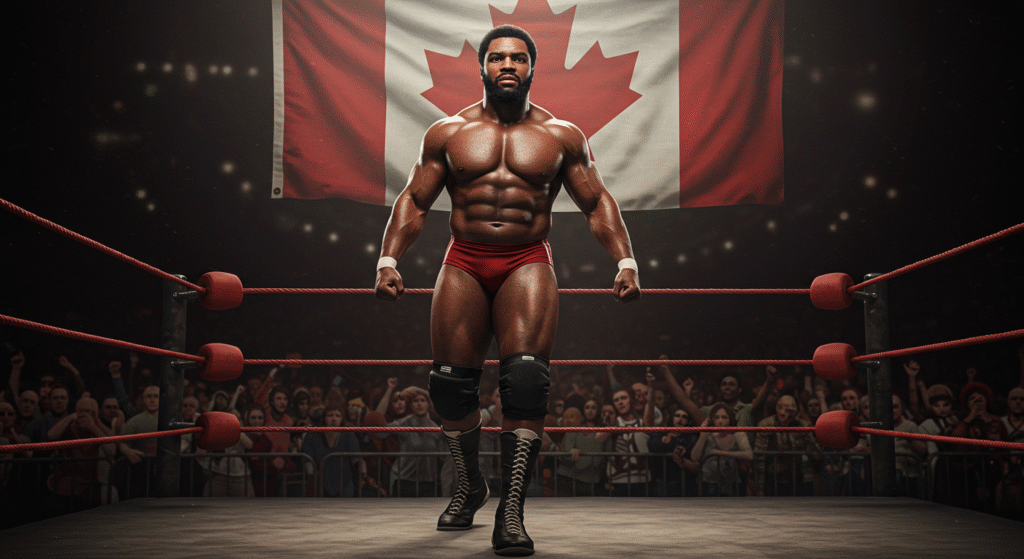
The story of Dwayne Johnson’s father ethnicity begins with Rocky Johnson, born Wayde Douglas Bowles in Amherst, Nova Scotia, Canada. Rocky’s lineage represents a powerful chapter in African-American history, specifically connecting to the Black Nova Scotian community that formed after the American Revolution.
Rocky Johnson was part of a community whose ancestors were Black loyalists who sided with the British during the American Revolution. These individuals, many of whom were formerly enslaved people, were promised freedom and land in exchange for their loyalty to the British Crown. After the war ended in 1783, thousands of these Black loyalists relocated to Nova Scotia, creating one of the earliest free Black communities in North America.
The Black Nova Scotian history is particularly significant because it represents a unique form of African-American ancestry that developed separately from the experiences of enslaved people in the southern United States. These communities maintained their own cultural traditions, faced their own challenges, and developed distinct identities that would later influence their descendants.
Rocky Johnson’s heritage can be traced back to families who established themselves in Cumberland County, Nova Scotia. Historical records show that his ancestors were among the settlers who worked to build new lives in challenging conditions, often facing discrimination and economic hardship despite their promised freedom.
What makes Rocky’s background even more compelling is the additional European influence in his lineage. Research indicates that Rocky Johnson also carried Irish blood, adding another layer to the mixed heritage that would eventually be passed down to his famous son. This combination of African, Irish, and Canadian influences created a unique cultural foundation that would later contribute to Dwayne’s multifaceted identity.
The impact of this African-Canadian descent on Dwayne Johnson cannot be understated. Growing up, he learned about the strength and resilience of his paternal ancestors, who overcame significant obstacles to establish themselves in a new country. This knowledge of his family lineage and ancestry instilled in him a deep appreciation for hard work, perseverance, and the importance of fighting for one’s place in the world.
Rocky Johnson himself became a trailblazer in professional wrestling, breaking barriers as one of the first successful Black wrestlers in what was then a predominantly white industry. His achievements in the wrestling world, including becoming the first Black Georgia Heavyweight Champion, laid the groundwork for what would become a wrestling dynasty.
The cultural pride that Rocky Johnson demonstrated throughout his career served as an important model for his son. He never tried to hide or downplay his heritage, instead using his platform to represent his community with dignity and strength. This approach to ethnic representation in Hollywood would later influence how Dwayne Johnson would handle his own multicultural identity in the entertainment industry.
Understanding Rocky Johnson’s African-Canadian descent also provides context for some of the values that Dwayne Johnson espouses today. The strong sense of community, the importance of family loyalty, and the belief in working hard to overcome obstacles all trace back to the Black Nova Scotian traditions that were part of his father’s upbringing.
The connection to Black loyalists also represents an important but often overlooked aspect of North American history. While many discussions of African diaspora focus on the experiences of enslaved people in the American South, the Black Nova Scotian community represents a different path to freedom and self-determination. This unique historical background contributes to the complexity and richness of Dwayne Johnson ethnicity.
Rocky Johnson’s influence extended beyond just genetics and heritage. He actively shared stories of his ancestors with his son, ensuring that the younger Johnson understood the significance of his African-Canadian roots. These family heritage stories became an integral part of Dwayne’s understanding of who he was and where he came from, contributing to his strong sense of cultural identity that would later make him such an appealing figure to diverse audiences worldwide.
His Mother Ata Maivia Connected Him to Samoan Royalty
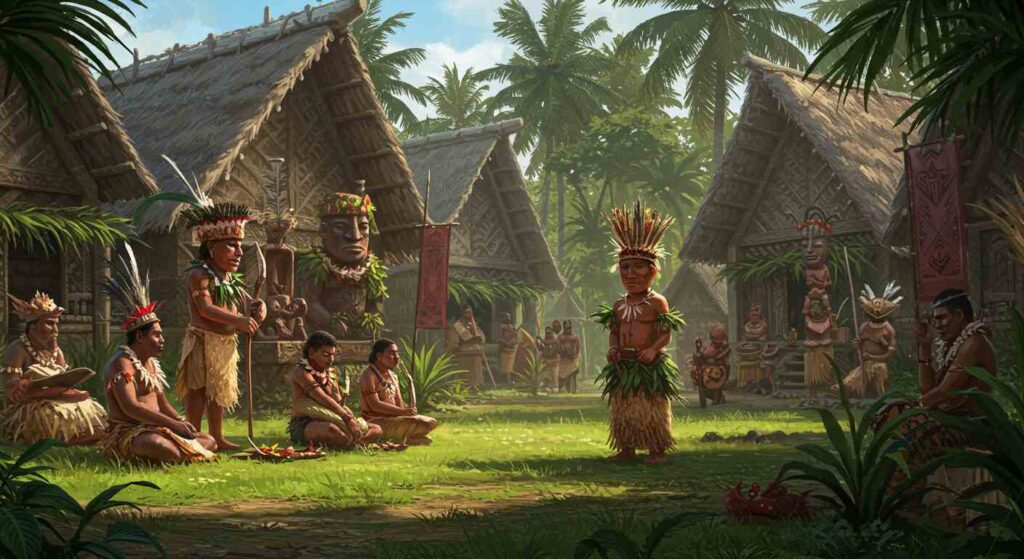
The maternal side of Dwayne Johnson ethnicity reveals an equally fascinating story rooted in Polynesian culture and royal bloodlines. His mother, Ata Maivia, represents a direct connection to Samoan royalty, making Johnson a descendant of some of the Pacific Islands’ most respected leaders and warriors.
Dwayne Johnson’s mother ethnicity traces back to the beautiful islands of Samoa, where his maternal lineage holds significant cultural importance. Ata Maivia’s biological father was John Sione Papali’itele Fitisemanu, whose ancestry connects directly to Malietoa Talavou Tonumaipe’a, who served as King of Samoa. This royal connection makes Johnson’s Samoan roots far more than just geographic heritage – it represents a legacy of leadership, strength, and cultural responsibility.
The Royal Lineage of Malietoa Talavou Tonumaipe’a
The story of Johnson’s Samoan royalty begins with Malietoa Talavou Tonumaipe’a, a paramount chief who ruled during a critical period in Samoan history. The Malietoa title represents the highest chiefly rank in Samoa, traditionally held by individuals who demonstrated exceptional leadership qualities and deep cultural knowledge.
Understanding this royal connection helps explain many of the values and characteristics that define Johnson today. Samoan traditions emphasize respect for family (aiga), community service, and maintaining honor through one’s actions. These principles, passed down through generations, have clearly influenced Johnson’s approach to his career and personal life.
The cultural pride associated with this royal heritage extends beyond mere ancestry. In Samoan culture, being connected to chiefly families carries responsibilities to the community and expectations of leadership. Johnson has embraced these responsibilities, often speaking about his Samoan heritage with deep reverence and using his platform to promote Pacific Islander representation.
The Scottish Connection Through Samoan Heritage
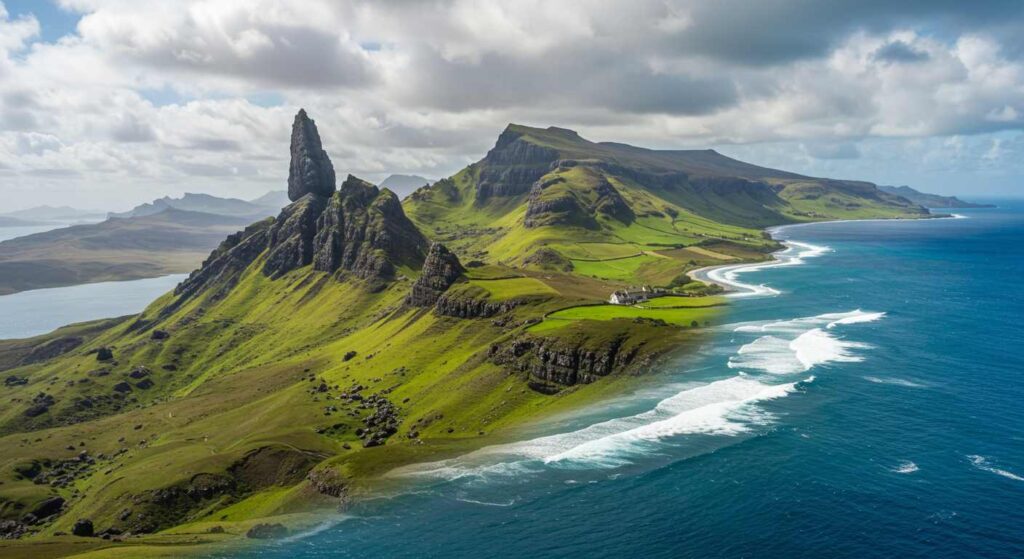
Interestingly, Dwayne Johnson ethnicity also includes Scottish ancestry through his maternal line. His great-great-grandmother, Alisa Jane Tuiloma Crichton, was the daughter of John Tuiloma Crichton, whose father came from Glasgow, Scotland. This makes Johnson approximately 1/16th Scottish, adding another European element to his already diverse heritage.
This Scottish connection through his Samoan roots illustrates the complex history of Pacific Islander communities, where European traders, missionaries, and settlers intermarried with local families. Rather than diluting the Samoan culture, these connections often strengthened family ties and created broader networks of relationships across the Pacific.
Peter Maivia and the Wrestling Connection
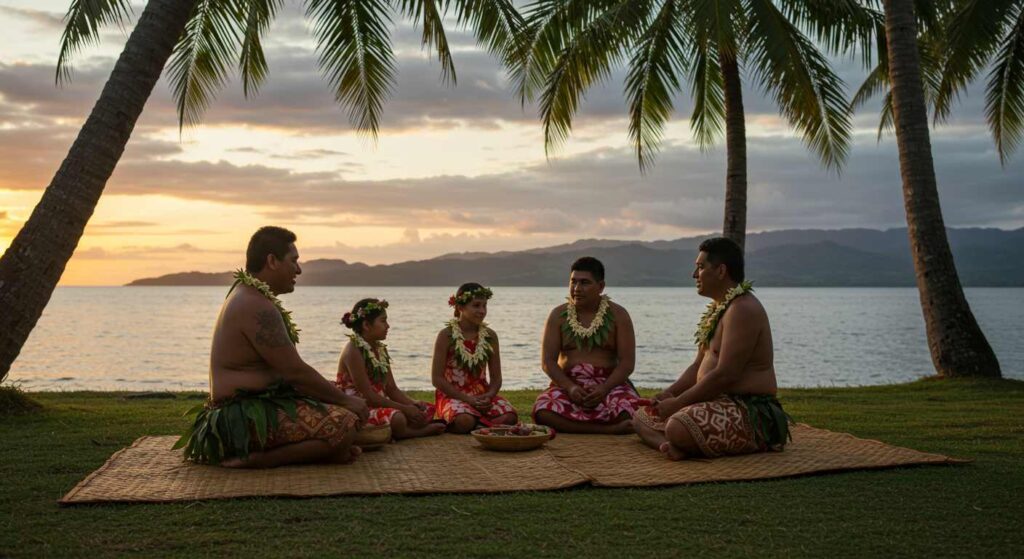
The family lineage and ancestry on his mother’s side also includes the legendary Peter Maivia, who became Ata’s adoptive stepfather. Peter Maivia, born Fanene Pita Anderson, was a highly respected professional wrestler who helped establish the wrestling tradition that would eventually influence Johnson’s career path.
Peter Maivia’s adoption into the family represents an important aspect of Samoan traditions – the concept of extended family (aiga) that goes beyond blood relations. In Samoan culture, individuals can become family members through marriage, adoption, or strong bonds of friendship and loyalty. This tradition explains how Peter Maivia became such an integral part of the family’s wrestling dynasty.
The influence of Peter Maivia on Johnson’s understanding of his Pacific Islander heritage cannot be overstated. Maivia served as a bridge between traditional Samoan culture and the modern world of professional wrestling, showing how cultural values could be maintained while pursuing success in new environments.
Growing Up With Polynesian Values
Johnson’s connection to Polynesian culture shaped his worldview from an early age. Samoan traditions and values emphasize several key principles that are clearly evident in Johnson’s personal and professional life:
Fa’a Samoa (the Samoan way) teaches respect for elders, loyalty to family, and the importance of hard work. These values align perfectly with the work ethic that has made Johnson successful in multiple industries.
Alofa (love and compassion) is another fundamental Samoan value that Johnson demonstrates through his interactions with fans, charitable work, and genuine care for others in the entertainment industry.
Tautua (service) represents the obligation to serve one’s family and community. Johnson’s advocacy for Pacific Islander representation and his efforts to create opportunities for others reflect this deeply ingrained value.
The Significance of His Tribal Tattoos
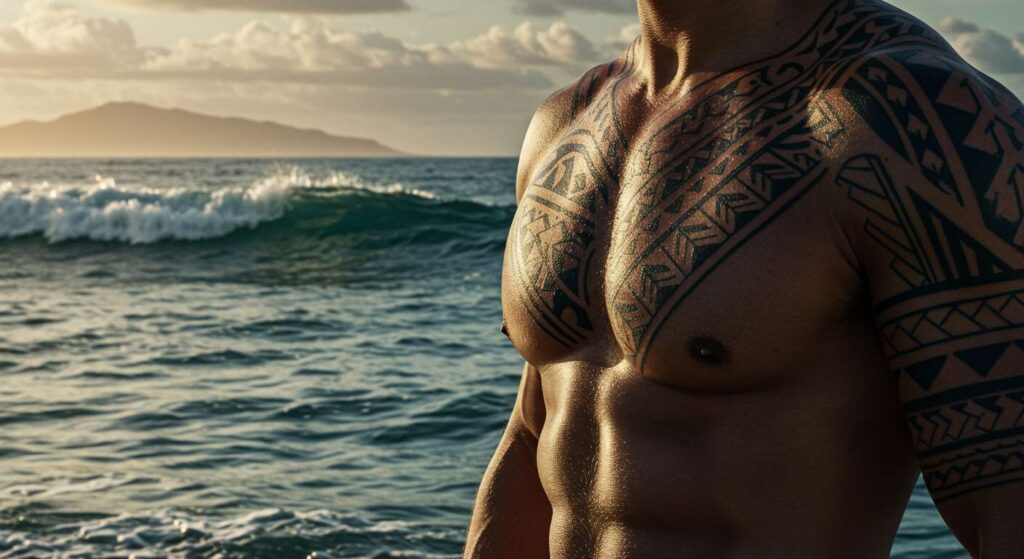
One of the most visible representations of Johnson’s Samoan heritage is his extensive tribal tattoos, particularly his “pe’a” chest and arm tattoo. This traditional Samoan tattoo carries deep cultural meaning and represents his connection to Polynesian culture.
The tribal tattoos significance extends far beyond aesthetics. In Samoan culture, traditional tattoos tell stories, mark important life events, and demonstrate cultural commitment. Johnson’s decision to receive these tattoos was not taken lightly – it represents a public declaration of his cultural identity and respect for Samoan traditions.
Each element of his tattoos has specific meaning related to his family history, personal journey, and cultural values. The coconut leaves represent a Samoan chief warrior, the sun represents riches and brightness, and the sea turtle represents longevity and fertility. These symbols connect him directly to centuries-old Samoan storytelling traditions.
Cultural Impact on His Career Choices
The influence of Dwayne Johnson’s cultural identity can be seen throughout his career decisions. His role in Disney’s “Moana” allowed him to represent Polynesian culture on a global stage, introducing millions of viewers to Pacific Islander traditions and values.
Johnson has consistently chosen projects that allow him to honor his heritage while entertaining audiences. His production company frequently develops content that celebrates diversity and provides opportunities for underrepresented communities, reflecting the Samoan value of lifting others as you climb.
Modern Representation of Ancient Traditions
Johnson’s approach to representing his Samoan roots in modern media demonstrates how traditional cultures can thrive in contemporary settings. Rather than abandoning or downplaying his heritage as he achieved mainstream success, he has amplified it, showing how multicultural identity can be a source of strength rather than conflict.
His success has opened doors for other Pacific Islander performers and has brought greater awareness to Polynesian culture worldwide. This representation matters tremendously for young Pacific Islanders who can now see themselves reflected in mainstream entertainment.
The Anoa’i Family Wrestling Dynasty
Johnson’s maternal connections also link him to the famous Anoa’i wrestling family, one of the most successful dynasties in professional wrestling history. This connection through his Samoan heritage includes relationships with wrestlers like Roman Reigns, The Usos, and Rikishi.
The Anoa’i family’s success in wrestling reflects traditional Samoan values of strength, honor, and family loyalty. The wrestling dynasty that includes Johnson represents how Samoan warrior spirit translated successfully into modern entertainment, creating opportunities for multiple generations of Pacific Islander performers.
Understanding this family connection helps explain Johnson’s early success in wrestling and his natural ability to connect with audiences. The combination of royal heritage, warrior traditions, and strong family support created the perfect foundation for his eventual success across multiple entertainment platforms.
The maternal side of Dwayne Johnson ethnicity thus represents not just ancestry but active cultural engagement. His Samoan roots continue to influence his choices, values, and approach to using his platform responsibly. This deep connection to Pacific Islander heritage has made him one of the most authentic and respected multicultural figures in modern entertainment.
How Mixed Heritage Shaped His Global Identity and Career Success
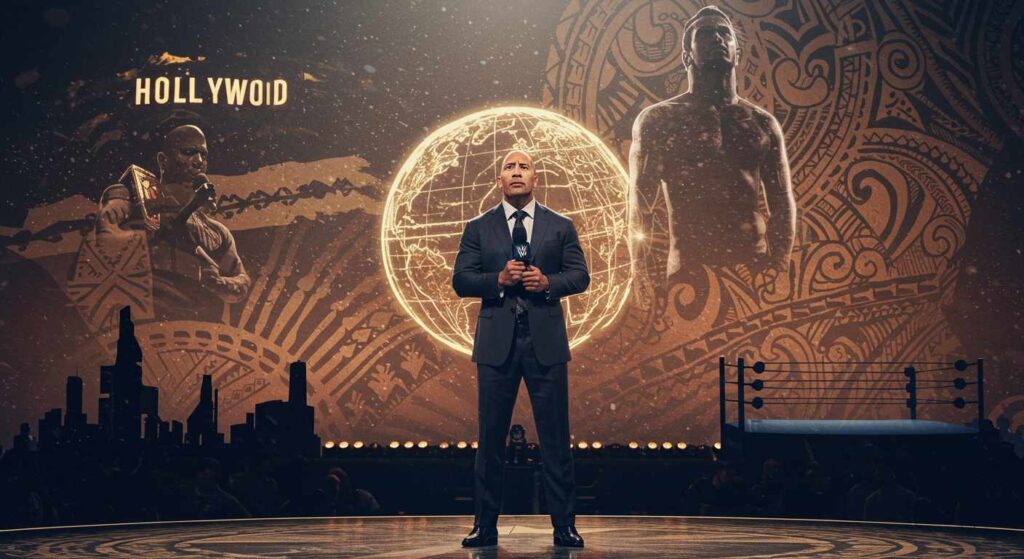
The complexity of Dwayne Johnson ethnicity extends far beyond simple genealogy. His unique combination of African-Canadian descent and Samoan roots has created a powerful example of how multicultural identity can become a source of strength, authenticity, and global appeal in modern entertainment.
Growing up with such diverse cultural influences, Johnson learned early that his mixed heritage was not something to compartmentalize but rather to celebrate as a unified whole. This approach to cultural diversity in entertainment has allowed him to connect with audiences across racial, ethnic, and cultural boundaries in ways that few entertainers have achieved.
The Power of Multicultural Upbringing in Entertainment
Johnson’s multicultural upbringing occurred across multiple geographic locations, each contributing different elements to his cultural education. Born in California, raised partly in Hawaii, spending time in Charlotte, North Carolina, and Connecticut, and visiting family in Canada and Samoa, he experienced firsthand how different communities express culture and identity.
This geographic diversity complemented his ethnic heritage perfectly. In Hawaii, he was surrounded by Pacific Islander heritage and learned to appreciate the natural connection between Polynesian culture and the ocean. In the continental United States, he observed how African-American ancestry manifested in different regional contexts. In Canada, he connected with the specific history of Black Nova Scotian communities.
These experiences taught Johnson that ethnic representation in Hollywood required more than just acknowledging ancestry. It demanded understanding how different cultures approach family relationships, work ethics, spiritual beliefs, and community responsibilities. His ability to authentically represent multiple cultural perspectives has made him uniquely valuable in an entertainment industry increasingly focused on authentic diversity.
Breaking Down Cultural Barriers Through Authenticity
One of the most remarkable aspects of Johnson’s career has been his ability to avoid being pigeonholed by any single aspect of his heritage. Unlike many mixed-race celebrities who feel pressure to identify primarily with one cultural group, Johnson has consistently presented himself as proudly multicultural.
This authenticity resonates particularly well with younger audiences who increasingly identify as multicultural themselves. According to recent census data, the number of Americans identifying as multiracial has increased dramatically over the past decade. Johnson’s visible success as someone who celebrates rather than minimizes his mixed heritage provides a powerful role model for this growing demographic.
His approach to cultural pride demonstrates how modern celebrities can honor their ancestors while building bridges between different communities. Rather than seeing his African-Canadian and Samoan heritage as competing identities, he presents them as complementary sources of strength and wisdom.
The Impact of Family Heritage Stories on Professional Choices
Throughout his career, Johnson has consistently drawn upon family heritage stories to inform his professional decisions. His understanding of Black loyalists and their journey to Nova Scotia influences his approach to roles that involve themes of perseverance and overcoming adversity. His knowledge of Samoan warrior spirit and royal traditions guides his selection of action roles and leadership positions.
These family lineage and ancestry connections are not mere biographical details but active influences on his career trajectory. When choosing film projects, Johnson frequently considers whether the role allows him to represent positive aspects of his cultural heritage or advance ethnic representation in Hollywood.
His production company, Seven Bucks Productions, actively develops content that celebrates cultural diversity in entertainment. Projects like “Jungle Cruise” and “Black Adam” were shaped by his understanding of how to create entertainment that appeals to global audiences while maintaining cultural authenticity.
Global Appeal Through Cultural Understanding
The international success of Johnson’s films demonstrates how multicultural identity can enhance rather than limit commercial appeal. His mixed heritage allows him to connect authentically with audiences in markets where African-American history, Polynesian culture, or immigrant experiences resonate strongly.
In countries with significant Pacific Islander populations, Johnson is celebrated as a proud representative of Samoan traditions. In Canada, his connection to Black Nova Scotian heritage creates a special bond with audiences who share that historical experience. In the United States, his ability to speak authentically about both African-Canadian descent and Samoan royalty appeals to increasingly diverse audiences.
This global connectivity extends beyond box office success to genuine cultural impact. Johnson’s visibility has increased international awareness of both Black Nova Scotian history and Samoan royal lineage, introducing millions of people to cultural traditions they might never have encountered otherwise.
Navigating Identity in a Complex Cultural Landscape
Johnson’s approach to managing his multicultural identity in public offers valuable lessons for other entertainers and public figures dealing with similar complexity. Rather than allowing others to define or limit his cultural expression, he has consistently taken ownership of his narrative.
His social media presence frequently celebrates both sides of his heritage equally. Family heritage stories from his African-Canadian ancestors appear alongside celebrations of Samoan traditions and values. This balanced representation demonstrates how individuals with mixed heritage can honor all aspects of their background without diluting any single cultural connection.
The authenticity of this approach has earned respect from cultural communities on both sides of his heritage. African-American communities appreciate his acknowledgment of Black loyalists and their contributions to North American history. Pacific Islander communities celebrate his promotion of Polynesian culture and his respectful engagement with traditional practices.
Professional Wrestling as Cultural Bridge
Johnson’s success in professional wrestling provided an early platform for exploring how his multicultural upbringing could become a professional asset. Wrestling audiences were initially introduced to him as Rocky Maivia, a name that honored both his African-Canadian father and his Samoan stepgrandfather.
This dual heritage created a unique wrestling persona that could draw upon African-American traditions of overcoming adversity and Samoan warrior spirit simultaneously. The combination proved powerful, allowing him to connect with diverse wrestling audiences and establish credibility across different cultural communities.
His wrestling career also taught him how to present cultural diversity in entertainment as strength rather than confusion. Audiences learned to see his mixed heritage as adding depth and authenticity to his character rather than creating uncertainty about his identity.
Hollywood Representation and Cultural Responsibility
As Johnson transitioned to film acting, his understanding of ethnic representation in Hollywood evolved beyond personal success to community responsibility. He recognized that his visibility created opportunities to advance representation for both African-Canadian and Pacific Islander communities.
His casting choices often prioritize projects that allow authentic cultural representation. Films like “Moana” enabled him to introduce Polynesian culture to global audiences through a major studio production. His involvement in the “Fast and Furious” franchise has consistently promoted themes of multicultural family bonds and loyalty.
Johnson’s production work has created opportunities for other performers from underrepresented backgrounds. His commitment to cultural diversity in entertainment extends beyond his own roles to actively developing projects that feature authentic multicultural storytelling.
The Evolution of Multicultural Identity in Entertainment
Johnson’s career trajectory illustrates how ethnic representation in Hollywood has evolved over the past two decades. Early in his entertainment career, industry expectations often pushed multicultural performers to emphasize whichever aspect of their heritage seemed most commercially viable.
Johnson’s success in maintaining authentic representation of his complete multicultural identity has helped establish new industry norms. His approach demonstrates that audiences respond positively to authentic cultural complexity rather than simplified ethnic categorization.
This evolution has created opportunities for other mixed-race celebrities to present their heritage more authentically. Johnson’s visibility and success have helped normalize the idea that multicultural identity can be a professional asset rather than a marketing challenge.
Cultural Education Through Entertainment
Beyond personal success, Johnson has used his platform to educate audiences about both African-Canadian and Samoan cultural traditions. His interviews frequently include family heritage stories that introduce mainstream audiences to lesser-known aspects of North American and Pacific Islander history.
His discussion of Black Nova Scotian heritage has brought attention to this important but often overlooked community. His celebration of Samoan royal lineage has increased mainstream awareness of Pacific Islander political and cultural traditions.
This educational approach reflects the depth of Johnson’s understanding of his cultural identity. Rather than treating his heritage as simply personal background, he recognizes the opportunity and responsibility that comes with representing underrepresented communities in mainstream entertainment.
The third fact about Dwayne Johnson ethnicity thus reveals how mixed heritage can become a source of strength, authenticity, and global connection when embraced fully and presented authentically. His success demonstrates that multicultural identity represents the future of entertainment rather than a complication to be managed.
Final Thoughts: The Cultural Legacy of Dwayne Johnson’s Heritage
The story of Dwayne Johnson ethnicity represents far more than an interesting biographical detail. It embodies the evolving nature of American identity and demonstrates how cultural diversity in entertainment can become a source of strength rather than division. Johnson’s journey from a young man struggling to understand his place in the world to becoming one of the most beloved figures in global entertainment illustrates the power of embracing one’s complete heritage.
Throughout his career, Johnson has consistently demonstrated that multicultural identity does not require choosing sides or minimizing certain aspects of one’s background. His African-Canadian descent and Samoan roots work together to create a unique perspective that has allowed him to connect with audiences worldwide while maintaining authentic connections to both cultural traditions.
The impact of his approach to ethnic representation in Hollywood extends beyond his personal success. Johnson has opened doors for other performers from diverse backgrounds and has shown entertainment executives that audiences hunger for authentic multicultural storytelling. His production work continues to create opportunities for underrepresented communities while proving that diversity drives commercial success.
Frequently Asked Questions
What ethnicity is Dwayne “The Rock” Johnson?
Dwayne Johnson ethnicity includes African-Canadian descent on his father’s side and Samoan roots on his mother’s side. His father, Rocky Johnson, was born in Nova Scotia, Canada, and descended from Black Nova Scotian communities that trace back to Black loyalists who settled in Canada after the American Revolution. His mother, Ata Maivia, is of Samoan heritage and descends from Samoan royalty, specifically connecting to Malietoa Talavou Tonumaipe’a, who served as King of Samoa.
Johnson also has small amounts of Irish ancestry through his father’s line and Scottish heritage through his mother’s side, making him approximately 1/16th Scottish. This mixed heritage creates a unique combination of African-Canadian, Polynesian, and European influences that have all contributed to his cultural identity.
Why is Dwayne Johnson called “The Rock”?
Dwayne Johnson earned the nickname “The Rock” during his professional wrestling career in WWE. Initially, he wrestled under the name Rocky Maivia, which combined his father’s nickname “Rocky” Johnson with his stepgrandfather Peter Maivia’s surname. However, audiences initially rejected this character, leading to the evolution of “The Rock” persona.
The name reflects both his physical presence and his unshakeable determination. In Samoan culture, strength and resilience are highly valued traits, and the rock symbolizes these qualities perfectly. The nickname also allowed him to maintain connection to his family lineage and ancestry while creating a distinct identity that could appeal to wrestling audiences.
When Johnson transitioned to Hollywood, he initially used both names but eventually became known primarily as Dwayne Johnson while maintaining “The Rock” as his social media handle and production company name.
How has Dwayne Johnson’s heritage influenced his career choices?
Johnson’s multicultural upbringing has significantly influenced his professional decisions throughout his career. His understanding of both African-American history and Polynesian culture guides his selection of roles and production projects that allow authentic cultural representation.
Films like “Moana” enabled him to represent Pacific Islander heritage on a global stage, while his involvement in action films often draws upon Samoan warrior spirit and themes of family loyalty. His production company actively develops content that celebrates cultural diversity in entertainment while creating opportunities for underrepresented performers.
Johnson frequently chooses projects that align with the values he learned from both sides of his heritage: perseverance from his African-Canadian ancestors and loyalty from his Samoan family traditions.
Is Dwayne Johnson related to other famous wrestlers?
Yes, Johnson is connected to one of wrestling’s most successful families through his Samoan heritage. He is part of the Anoa’i wrestling family, which includes performers like Roman Reigns, The Usos (Jimmy and Jey Uso), and Rikishi. These connections come through his mother’s side and the adoption networks that are traditional in Samoan culture.
His stepgrandfather Peter Maivia was also a legendary wrestler who helped establish the wrestling dynasty that Johnson would later join. This family lineage and ancestry in professional wrestling provided him with both training opportunities and industry connections that facilitated his early career success.
The Anoa’i family’s success in wrestling reflects traditional Samoan values of strength, honor, and family loyalty that have been successfully translated into modern entertainment.